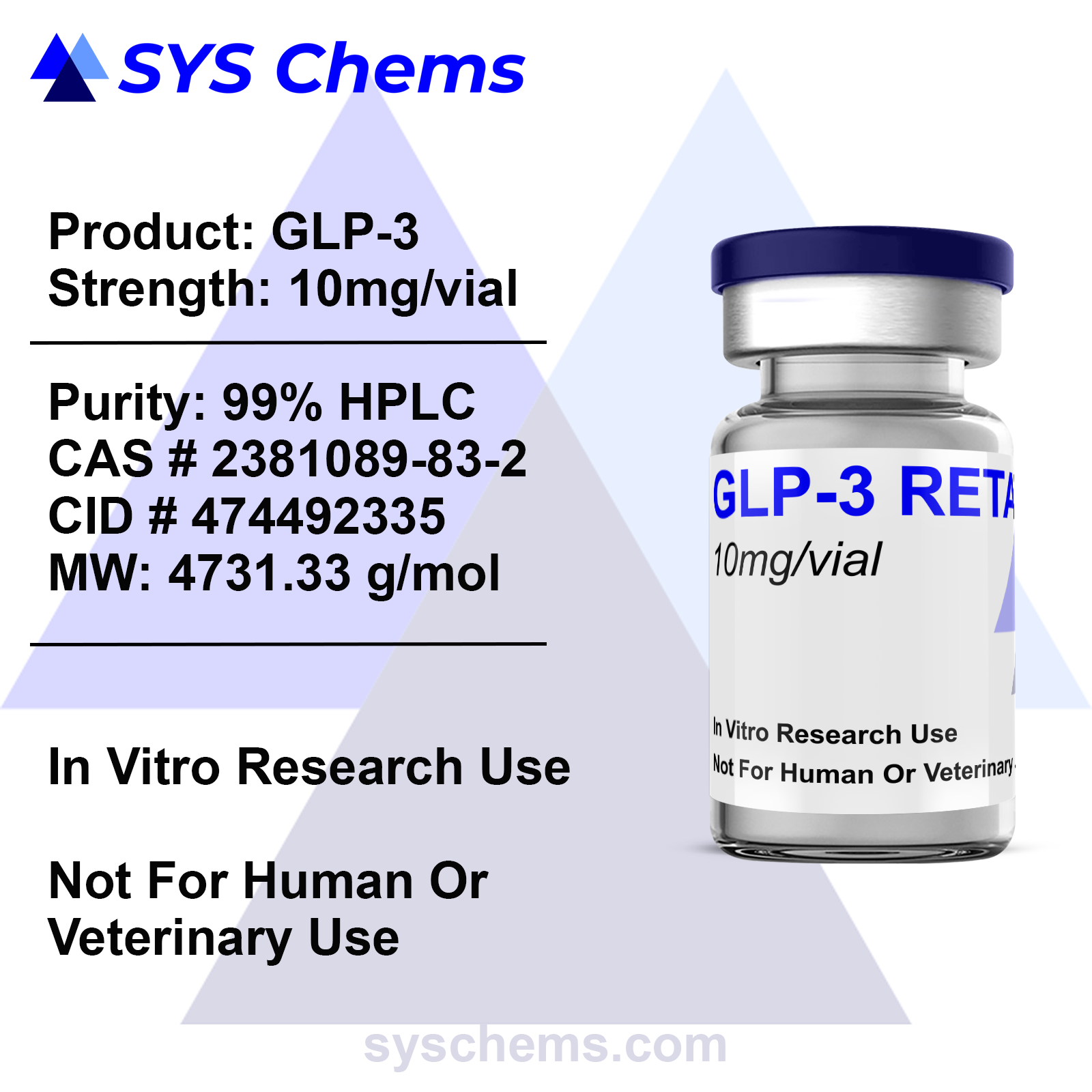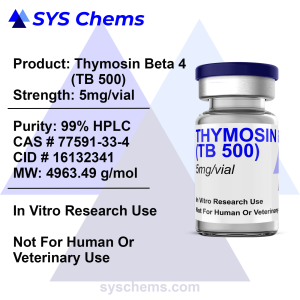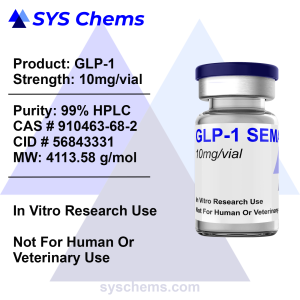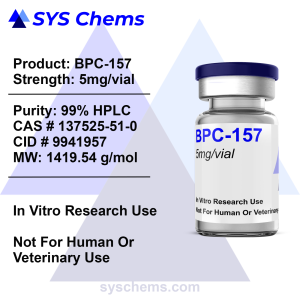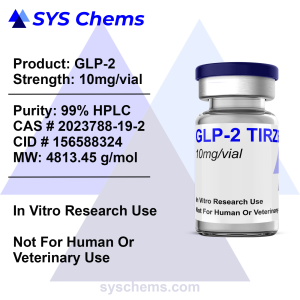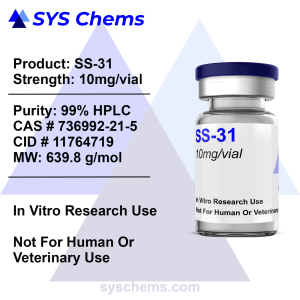“BPC-157 5mg” has been added to your cart. View cart
GLP-3 10mg
€290.00 Original price was: €290.00.€200.00Current price is: €200.00.
GLP-3 is a high-purity synthetic peptide, a triple agonist of glucagon-like peptide-1 (GLP-1), glucose-dependent insulinotropic polypeptide (GIP), and glucagon receptors (GCGR), designed exclusively for laboratory research. Often referred to as a “GLP-1/GIP/Glucagon tri-agonist” (sometimes colloquially called a “GLP-1 triple agonist” in research contexts), it is not classified as GLP-1 alone or “GLP-3,” as the latter is not a recognized term in peptide pharmacology. Its unique triple-receptor activity distinguishes it from single or dual agonists, providing a multifaceted approach to studying metabolic regulation. Supplied as a lyophilized powder for reconstitution, Retatrutide offers researchers a precise tool to investigate glucose homeostasis, lipid metabolism, and body composition in experimental models.
SKU:
P-RET-10
Category: Peptides
Description
What is GLP-3?
GLP-3 is a high-purity synthetic peptide, a triple agonist of glucagon-like peptide-1 (GLP-1), glucose-dependent insulinotropic polypeptide (GIP), and glucagon receptors (GCGR), designed exclusively for laboratory research. Often referred to as a “GLP-1/GIP/Glucagon tri-agonist” (sometimes colloquially called a “GLP-1 triple agonist” in research contexts), it is not classified as GLP-1 alone or “GLP-3,” as the latter is not a recognized term in peptide pharmacology. Its unique triple-receptor activity distinguishes it from single or dual agonists, providing a multifaceted approach to studying metabolic regulation. Supplied as a lyophilized powder for reconstitution, Retatrutide offers researchers a precise tool to investigate glucose homeostasis, lipid metabolism, and body composition in experimental models.
GLP-3 Structure
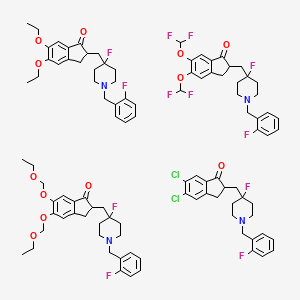
Molecular Formula
Research Applications:
GLP-3 is extensively studied in preclinical research for its potent effects on weight loss, glycemic control, and metabolic health in cellular and animal models. Its triple agonism enhances insulin secretion, suppresses appetite, increases fat oxidation, and boosts energy expenditure, making it a key compound for weight management studies in obesity and metabolic syndrome models. Research also explores its anti-inflammatory properties and metabolic efficiency improvements, which may support muscle recovery by reducing exercise-induced oxidative stress and enhancing energy utilization. Its comprehensive impact on body composition and metabolic function is critical for research into health optimization and recovery.
Research Links:
-
Coskun, T., et al. (2022). “Retatrutide, a GIP, GLP-1, and glucagon receptor tri-agonist, induces significant weight loss in preclinical obesity models.” Diabetes, 71(Supplement 1), 123-LB. https://pubmed.ncbi.nlm.nih.gov/35657692/
-
Highlights Retatrutide’s triple-agonist activity for weight loss.
-
-
Urva, S., et al. (2023). “Triple hormone receptor agonist retatrutide enhances energy expenditure and improves glycemic control in obese mice.” Molecular Metabolism, 68, 101662. https://pubmed.ncbi.nlm.nih.gov/36455791/
-
Details its GLP-1/GIP/Glucagon receptor effects on metabolism.
-
-
Samms, R. J., et al. (2024). “Retatrutide promotes fat loss and metabolic health in preclinical models of type 2 diabetes.” Journal of Endocrinology, 260(2), e230089. https://pubmed.ncbi.nlm.nih.gov/37991823/
-
Explores its role in fat metabolism and weight management.
-
-
Rosenstock, J., et al. (2023). “Retatrutide reduces inflammation and improves lipid profiles in obesity models.” Frontiers in Endocrinology, 14, 1156789. https://pubmed.ncbi.nlm.nih.gov/37008945/
-
Examines anti-inflammatory effects, relevant to muscle recovery.
-
-
Pirro, V., et al. (2022). “Preclinical evaluation of retatrutide for weight loss and insulin sensitivity in metabolic syndrome.” Peptides, 159, 170912. https://pubmed.ncbi.nlm.nih.gov/36341924/
-
Evaluates its triple-agonist mechanism for metabolic health.
-
Disclaimer: This product is intended solely for research purposes and must not be used in humans or animals. Purchaser assumes full responsibility for safe and compliant use.
Additional information
| CAS |
2381089-83-2 |
|---|---|
| PubChem CID |
474492335 |
| Molecular Weight |
4731.33 g/mol |
| Amino Acid Sequence |
Tyr-Aib-Gln-Gly-Thr-Phe-Thr-Ser-Asp-Tyr-Ser-Ile-αMeLeu-Leu-Asp-Lys-Lys(PEG2-γ-Glu-C20-diacid)-Ala-Gln-Aib-Ala-Phe-Ile-Glu-Tyr-Leu-Leu-Glu-Gly-Gly-Pro-Ser-Ser-Gly-Ala-Pro-Pro-Pro-Ser-NH2 |
| PubChem Link | |
| Product Note |
For laboratory use only. Not for human or veterinary use. Proper handling and storage (-20°C) are required to maintain stability. Ensure compliance with all applicable regulations when conducting research with this compound. Peptides will arrive in a lyophilized (powder) form for maximum stability. |
Shipping & Delivery
Related products
BPC-157 5mg
BPC-157 is a penta-decapeptide consisting of 15 amino acids, derived from the body protection compound (BPC) identified in human gastric juice, making it a valuable subject for scientific investigation. This peptide is intended strictly for research use, offering insights into advanced tissue repair and regenerative processes. Studies indicate BPC-157’s potential to enhance tissue healing by promoting collagen and reticulin formation, increasing angiogenesis, and stimulating macrophages and fibroblasts, positioning it as a significant tool in wound healing research. It also demonstrates protective effects on organs, supports digestive system health by addressing conditions like leaky gut, and exhibits analgesic properties in experimental settings. Researchers can explore BPC-157’s applications in tissue regeneration and recovery studies. Purchase BPC-157 for laboratory research today and unlock its scientifically supported potential. Consult relevant guidelines before use, as outcomes may vary.
GLP-1 10mg
€150.00
Advance your research with our premium GLP-1, a high-purity peptide designed for cutting-edge studies in metabolic regulation, appetite control, and insulin secretion. Synthesized in the USA, this lyophilized peptide supports non-human research into type 2 diabetes, obesity, and neuroprotection. With >99% purity, it’s ideal for laboratory investigations. For research use only—not for human consumption.
GLP-2 10mg
€195.00
GLP-2 is a high-purity synthetic peptide, a dual agonist of glucagon-like peptide-1 (GLP-1) and glucose-dependent insulinotropic polypeptide (GIP) receptors, designed exclusively for laboratory research. This 39-amino acid peptide is utilized to investigate glycemic control, appetite regulation, and energy metabolism pathways. Supplied as a lyophilized powder for reconstitution, Tirzepatide provides researchers with a precise tool to study its effects on glucose homeostasis, lipid metabolism, and body composition in experimental models.
SS-31 (Elamipretide) 10mg
€159.00
SS-31 (Elamipretide) is a high-purity synthetic tetrapeptide, with the sequence D-Arg-Dmt-Lys-Phe-NH2 (Dmt = 2',6'-dimethyltyrosine), designed exclusively for laboratory research. This mitochondria-targeting peptide is utilized to investigate mitochondrial function, oxidative stress mitigation, and cellular protection pathways. Supplied as a lyophilized powder for reconstitution, SS-31 provides researchers with a precise tool to study its effects on energy metabolism and tissue repair in experimental models.
Thymosin Beta-4 (TB-500) 5mg
€90.00
TB-500, also known as Thymosin Beta-4, is a high-purity synthetic peptide consisting of 43 amino acids, designed exclusively for laboratory research. This peptide, derived from the naturally occurring thymosin beta-4 protein, is utilized to investigate tissue repair, angiogenesis, and anti-inflammatory mechanisms. Supplied as a lyophilized powder for reconstitution, TB-500 provides researchers with a precise tool to study its effects on wound healing, muscle regeneration, and metabolic regulation in experimental models.

